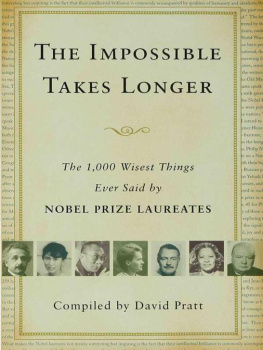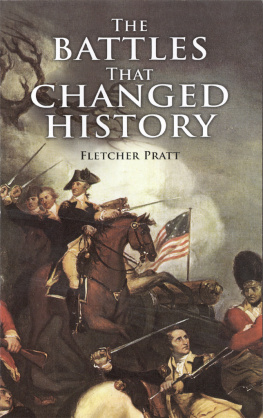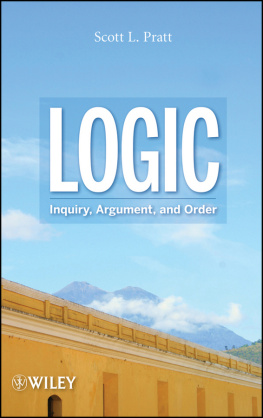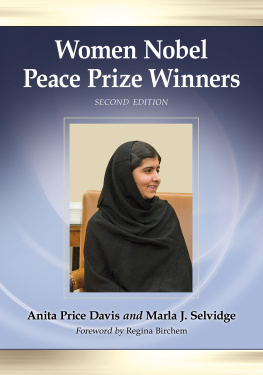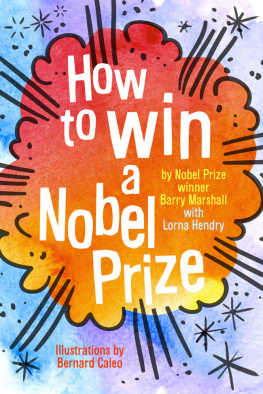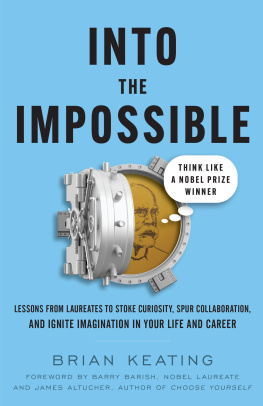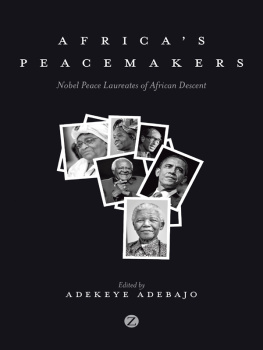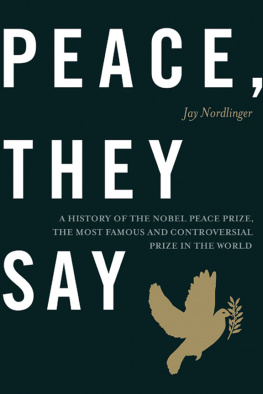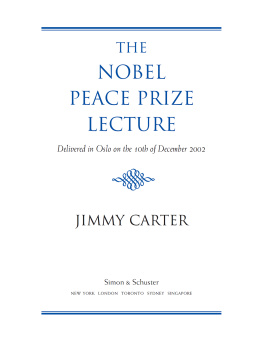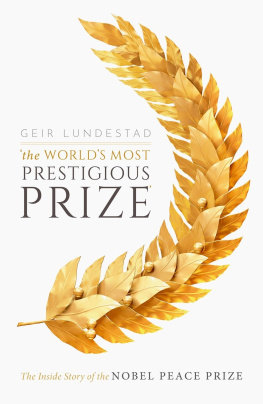THE IMPOSSIBLE TAKES LONGER
The Impossible Takes Longer
THE 1,000 WISEST THINGS EVER SAID
BY NOBEL PRIZE LAUREATES

Compiled by DAVID PRATT

Copyright 2007 by David Pratt
All photos are copyright by The Nobel Foundation and used by permission. Images may not be reproduced without written consent from the foundation.
All rights reserved. No part of this book may be used or reproduced in any manner whatsoever without written permission from the publisher except in the case of brief quotations embodied in critical articles or reviews. For information address Walker & Company, 104 Fifth Avenue, New York, New York 10011.
Published by Walker Publishing Company, Inc., New York
Distributed to the trade by Holtzbrinck Publishers
All papers used by Walker & Company are natural, recyclable products made from wood grown in well-managed forests. The manufacturing processes conform to the environmental regulations of the country of origin.
LIBRARY OF CONGRESS CATALOGING-IN-PUBLICATION DATA HAS BEEN APPLIED FOR.
ISBN-10: 0-8027-1637-7
eISBN:978-0-802-71887-7
Visit Walker & Company's Web site at www.walkerbooks.com
First U.S. edition 2007
1 3 5 7 9 10 8 6 4 2
Typeset by Westchester Book Group
Printed in the United States of America by Quebecor World Fairfield
CONTENTS


F or more than a century, the Nobel Prize has been the hallmark of genius. The lives and the work of the 768 men and women who have won the prize since the first prizes were awarded in 1901 show that this popular impression is not misplaced. What makes the Nobel laureates not merely interesting but inspiring is the fact that their intellectual brilliance is commonly accompanied by qualities of humanity and idealism. Not only are they extraordinary minds; they are extraordinary people, whose observations on a wide range of issues are of intrinsic interest.
The Nobel Foundation has, over the past century, carried out Alfred Nobel's wishes to honor "those who during the preceding year have conferred the greatest benefit on mankind." The benefits that this group of less than a thousand people has conferred on humanity are prodigious. Millions of lives have been saved or bettered by the work of Nobel laureates in medicine who gave us radium therapy, antibiotics, insulin, antidepressants, bone marrow and organ transplants, cardiac catheterization, the diphtheria serum, and the measles vaccine. Nobel Peace Prize winners played important roles in ending both World Wars, as well as the Suez Crisis of 1956, the Vietnam War, and the Cold War. Less historically visible are the tragedies and conflicts that have been prevented by the dedicated work of individual laureates and of Nobel Prize-winning organizations such as the Red Cross, Amnesty International, the United Nations Peacekeeping Forces, and Mdecins Sans Fronti?es.
Nobel laureates pioneered many technical inventions, often persevering for years in the face of apathy or derision by colleagues and the public. Their inventions include X-rays, magnetic resonance imaging, transistors, semiconductors, integrated circuits, lasers, and the electron microscope. And the world would be spiritually and aesthetically poorer without the writers who gave us such works as Lord of the Flies, Dr. Zhivago, Waiting for Godot, The Tin Drum, The Waste Land, The Forsyte Saga, The Old Man and the Sea, The Jungle Book, Man and Superman, and Of Mice and Men.
In many of the quotations in this collection, Nobel laureates speak about their specialized work. Physicists comment with perception or irony on physics, poets on poetry. But laureates also address, often with great insight, issues outside their immediate specializationin fact, they tend to be versatile in their interests. The conventional image of the Nobel Prize winner as an absentminded genius, eccentric in habits and solitary in lifestyle, fits hardly any of them.
A number of laureates were publicly prominent in their time. They include three presidents of the United States and numerous presidents and prime ministers of other nations. When they speak of public events, they do so from a privileged position. "History will be kind to me," Winston Churchill averred, "for I intend to write it."1
Music may serve as an example of the versatility of many laureates. Among the physicists, for example, Max Planck and Werner Heisenberg were both concert-level pianists. Gerald Edel-man played the violin in a symphony orchestra, Gerhard Herzberg was a noted bass-baritone, Albert Einstein's attachment to his violin is well known, and Richard Feynman would, at every opportunity, exercise his virtuosity on the bongo drums. Other Nobel laureates have excelled in sports. Niels Bohr was a soccer player, Dudley Herschbach a high school football star, Philip Noel-Baker ran in three Olympic Games, Max Perutz was a skier and mountaineer, and Henry Kendall was a scuba diver who lost his life on a National Geographic diving expedition. Ernest Hemingway once remarked, "My writing is nothing. My boxing is everything."2
With their high energy and restless minds, Nobel laureates are people whose tastes and interests are rarely limited to a single field. Thus we find the Russian physicist Pyotr Kapitsa remarking, "Ah, but it's impossible to live without poetry."3 Or Einstein rushing to embrace the young violinist Yehudi Menuhin after a concert in Berlin in 1930 and saying, "Now I know there is a God in Heaven."4
Einstein is the best-known science laureate, and his many observations, both whimsical and profound, are frequently quoted in anthologies. Otherwise, the scientists tend to be neglected in such collections in favor of a few well-known Literature laureates. In this collection, close to half of the laureates represented earned the prize in one of the sciences. The Impossible Takes Longer includes quotations from 73 laureates who won the prize for Literature, 53 for Peace, 45 for Physics, 43 for Medicine, 24 for Chemistry, and 18 for Economics. As will be seen from the quotations from the science laureates, many of them are highly articulate individuals who think deeply about matters of general concern. Working as they do at the frontiers of knowledge, exploring the mysteries of the cosmic, the subatomic, and the organic worlds, they have much to tell us not only about science but about many of the significant issues of our time.
In these pages laureates from different fields share their views on such topics as belief and religion, good and evil, joy and grief, ethics and morals. Many thousands of documents were perused in the compilation of this collection: novels, plays, and poetry; biographies and autobiographies; scientific papers and monographs; newspaper reports and interviews; letters, journals, lectures, and Web pages.
Anyone who studies the lives of the laureates quickly recognizes that they do not escape the hardships and tragedies that are the lot of humankind. Indeed, they often seem to have suffered more than their share of difficulties. Several lost one or both parents in childhood, and a sizable minority grew up in poverty. The wars of the twentieth century took beloved sons from Theodore Roosevelt, Rudyard Kipling, William Henry Bragg, and Robert Aumann. A large number of the scientists became refugees from Nazi Germany, and many others became exiles from their homelands. Of the 259 laureates represented here, at least 30 endured the experience of prison, whether as prisoners of war like Konrad Lorenz and Jean-Paul Sartre, civilian internees like Albert Schweitzer or James Chadwick, prisoners of conscience like Bertrand Russell and Aung San Suu Kyi, or inmates of concentration camps like Roald Hoffmann and Elie Wiesel. Almost all of them, at one time or another, experienced discouragement or setbacks in their careers.
Next page
